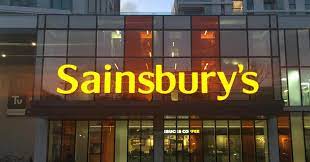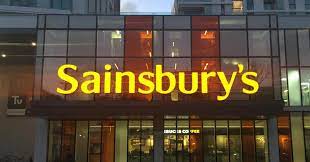
Customers at Sainsbury's are shifting to own-brand items and scaling back on non-essential expenditure as prices grow faster, according to the supermarket's CEO.
Simon Roberts went on to say that the strain on household budgets is only going to become worse during the rest of the year. Households have been trying to keep up with rising energy, food, and fuel costs.
Sainsbury's, according to Roberts, is "doing everything we can to keep pricing down."
Some consumers are "moving into economy own-label" when shopping for food, while Sainsbury's is seeing customers "drawing back" on general retail purchasing, with larger "big price" items "particularly difficult," according to Roberts.
Sainsbury's sales dipped 4 per cent in the 16 weeks to June 25 compared to the same period last year, but the difference was primarily due to how lockdowns in 2021 boosted up sales, he said.
Argos' sales were also down, owing in part to the squeeze on household budgets, according to chief financial officer Kevin O'Byrne.
According to a BBC-commissioned study last month, individuals are cutting back on food, petrol, and clothing as costs climb. According to a BBC poll, people are cutting back on food, petrol, and clothing as costs rise.
"We really understand how hard it is for millions of households right now and that's why we are investing £500m and doing everything we can to keep our prices low, especially on the products customers buy most often," Announcing Sainsbury's latest trading update, Roberts said.
"The pressure on household budgets will only intensify over the remainder of the year and I am very clear that doing the right thing for our customers and colleagues will remain at the very top of our agenda," he added.
According to Roberts, Sainsbury's suppliers are also under pressure as commodity prices such as fuel and fertiliser rise, owing in part to the conflict in Ukraine.
According to him, the grocery chain was working "extremely closely" with suppliers "to focus on how we handle" these pricing increases.
It was an issue of balancing "keeping prices low for customers while also maintaining things in stock," he explained.
The store has also come under fire from the campaign organisation Shareaction for not only paying the Living Wage of £9.90 per hour to its own employees, but also to contractors such as cleaners and security guards.
Sainsbury's pays employees "as fully as we can," according to Roberts.
The cost of living is rising at its fastest rate in 40 years, and the Bank of England has warned that prices may climb much faster in the coming months.
Despite its latest comments, Sainsbury's said it still expected full-year underlying profit before tax to be between £630m and £690m, as previously estimated.
According to Kantar, the average yearly shopping spend is expected to rise by £380 this year.
The study also discovered that buyers are shifting away from branded items and toward supermarket own-label items.
The government has put shops and other businesses under pressure to slash prices in order to reduce the burden on people.
Small businesses, on the other hand, have called the measures a "slap in the face," claiming that they have "already trimmed all expenses, even necessary ones, to the bone."
(Source:www.bbc.com)
Simon Roberts went on to say that the strain on household budgets is only going to become worse during the rest of the year. Households have been trying to keep up with rising energy, food, and fuel costs.
Sainsbury's, according to Roberts, is "doing everything we can to keep pricing down."
Some consumers are "moving into economy own-label" when shopping for food, while Sainsbury's is seeing customers "drawing back" on general retail purchasing, with larger "big price" items "particularly difficult," according to Roberts.
Sainsbury's sales dipped 4 per cent in the 16 weeks to June 25 compared to the same period last year, but the difference was primarily due to how lockdowns in 2021 boosted up sales, he said.
Argos' sales were also down, owing in part to the squeeze on household budgets, according to chief financial officer Kevin O'Byrne.
According to a BBC-commissioned study last month, individuals are cutting back on food, petrol, and clothing as costs climb. According to a BBC poll, people are cutting back on food, petrol, and clothing as costs rise.
"We really understand how hard it is for millions of households right now and that's why we are investing £500m and doing everything we can to keep our prices low, especially on the products customers buy most often," Announcing Sainsbury's latest trading update, Roberts said.
"The pressure on household budgets will only intensify over the remainder of the year and I am very clear that doing the right thing for our customers and colleagues will remain at the very top of our agenda," he added.
According to Roberts, Sainsbury's suppliers are also under pressure as commodity prices such as fuel and fertiliser rise, owing in part to the conflict in Ukraine.
According to him, the grocery chain was working "extremely closely" with suppliers "to focus on how we handle" these pricing increases.
It was an issue of balancing "keeping prices low for customers while also maintaining things in stock," he explained.
The store has also come under fire from the campaign organisation Shareaction for not only paying the Living Wage of £9.90 per hour to its own employees, but also to contractors such as cleaners and security guards.
Sainsbury's pays employees "as fully as we can," according to Roberts.
The cost of living is rising at its fastest rate in 40 years, and the Bank of England has warned that prices may climb much faster in the coming months.
Despite its latest comments, Sainsbury's said it still expected full-year underlying profit before tax to be between £630m and £690m, as previously estimated.
According to Kantar, the average yearly shopping spend is expected to rise by £380 this year.
The study also discovered that buyers are shifting away from branded items and toward supermarket own-label items.
The government has put shops and other businesses under pressure to slash prices in order to reduce the burden on people.
Small businesses, on the other hand, have called the measures a "slap in the face," claiming that they have "already trimmed all expenses, even necessary ones, to the bone."
(Source:www.bbc.com)














